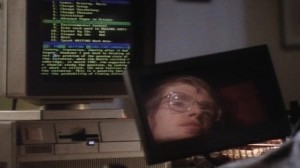STUDIO: Criterion | DIRECTOR: Errol Morris
RELEASE DATE: 3/18/14 | PRICE: DVD $24.99, DVD/Blu-Ray Combo 39.99
BONUSES: New interview with Errol Morris, new interview with cinematographer John Bailey, essay by David Sterritt, excerpts from Stephen Hawking’s writings
SPECS: G | 84 min. | Documentary | 1:85 widescreen | Dolby Digital 5.1/DTS-HD Master Audio 5.1RATINGS (out of 5 dishes): Movie
| Audio
| Video
| Overall
The Criterion release of A Brief History of Time, the enlightening and playful 1991 portrait of genius astrophysicist Stephen Hawking, appears at a good time for science documentaries, what with the current airing on Fox of the new Cosmos series. Errol Morris’ film is quite a different type of science doc, though, focusing on Hawking’s biography as it imaginatively “illustrates” a few of his more famous theories.
Morris loves to play with the notion of what a documentary is in his non-fiction films, and here he experiments with the notion of a docu-profile by intentionally not identifying any of the interview subjects in the film. They are i.d.’ed in the closing credits, but their titles and relationship to Hawking are discernible only from their statements.
He also takes care to parallel Hawking’s scientific theories with his personal medical journey. Diagnosed with ALS during his college years, Hawking proceeded to lose more and of his mobility as time went on. Hawking’s computerized voice narrates the movie, while the voices of his relatives and colleagues fill in the narrative “holes” — although we learn little about his roles as husband and father.
Hawking’s theories are present via elementary animation and computer graphics, with his narration explaining the concepts in the simplest terms possible. These sequences give an indication of how soundly theoretical — and at times fanciful — Hawking’s work is; it is emphasized that, as Hawking lost his mobility and the power of speech, his concepts became far grander in scope.
Considering just how complicated Hawking’s work can be, it’s surprising (and laudable) that Morris adhered to the title of the best seller that inspired the film and kept it “brief” at 85 minutes. The sense of wonderment emphasized in the theoretical scenes is reflected in the musical score by Philip Glass, who also collaborated with Morris on The Thin Blue Line (1988) and his Oscar-winning The Fog of War (2003).
The short documentary The Making of A Brief History of Time that was released by Paramount on VHS back in 1992 (separately from the Morris feature) isn’t present here, but two new interviews are included. In the first, cinematographer John Bailey (Mishima: A Life in Four Acts) discusses the limited amount of time Morris and crew had to film Hawking (three days total) and how they worked around it by creating a set that looked like his office and installing a double in a wheelchair. Bailey reveals that all of the interiors seen in the film were indeed sets — there was a “home” set for relatives, and an “office” set for his colleagues.
A new interview with Morris finds the filmmaker discussing the project as a one-of-a-kind encounter with a genius. He talks about his dissatisfaction with the computer graphics used to illustrate the scientific theories (he opted instead mid-project for conventional animation) and the fact that he was bold enough to joke around with Hawking (who wasn’t offended by his remarks).
Morris openly addresses the question of his non-verite approach — using sets to double for locations, creating animation sequences for the theories, “doubling” his subject — by acknowledging that there are usually “rules” in the documentary genre. His response? “To hell with them!”
|
Buy or Rent A Brief History of Time
|
|||
|---|---|---|---|
Blu-ray/DVD Combo |
 Blu-ray/DVD Combo Blu-ray/DVD Combo |
 Blu-ray/DVD Combo Blu-ray/DVD Combo |
|

Leave a Reply